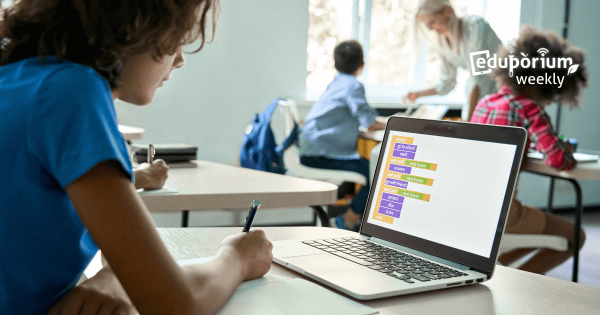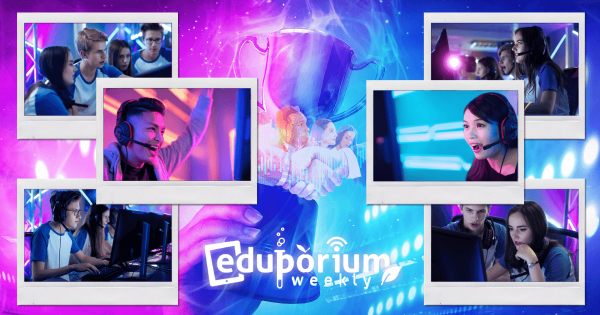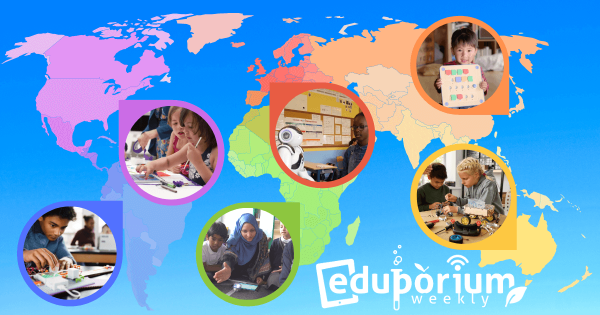We now have so many unique teaching styles and strategies for effectively communicating curricular content to your kids, including teacher-centered, student-centered, self-paced, competency-based, and even inquiry-based models among others. Then, there is culturally responsive teaching, which involves shifting instruction and language for kids from different cultures.
Eduporium Weekly
Our longest running current blog series, the Eduporium Weekly is your source for relevant education topics. Whether it's related to EdTech, STEM, SEL, makerspaces, soft skills, equity, CTE, or any number of other things, you are sure to find some relevant content here. Our team remains committed to providing intriguing and up-to-date opinions and perspectives on the most important topics—whether they're technology-based or not. Every week, we share our thoughts about those key topics in education. Giving educators a Saturday morning read, many of our Eduporium Weekly posts reflect recent happenings, important updates, or, sometimes, some fun revelations. We're also very fortunate to serve a community of such committed educators. For that reason, we strive to keep our thoughts and content fresh. And, this section of our blog is a great place to go for just that.
Whatever is happening in education, we believe our committed team members help educators adjust. As we've seen, technology has a place in all types of learning—as long as educators integrate it strategically. As debates and discussions in STEAM and general education evolve, we adapt this content to continually educate, inform, and entertain. Our perspective may be a bit unique but our collective expertise on these topics is always improving. We also encourage you to browse the pages or search for a topic of your interest on the left of your screen. We certainly take pride in being up to date with what teachers are experiencing. From our entire team, we hope this content truly provides you with guidance and inspiration. Check back every weekend, as well, for the latest edition of the Eduporium Weekly.
-
Eduporium Weekly | Teaching Students Career Readiness
Career readiness can mean any number of different things—especially as it pertains to today’s education landscape. As you know, students may move on to college, attend trade schools, or begin working right after completing high school. Thanks to career and technical education programs, however, many students can learn viable skills and quickly begin a relevant career. -
Eduporium Weekly | Coding For Kids Of Different Ages
There are typically two primary options for younger kids (or older students) to get started with coding: either physical tools or digital tools. Most of our expertise involves the physical coding tools, including educational robotics kits, circuitry solutions, or even programmable drones. Especially following the remote learning era, however, there are also strictly virtual platforms. -
Eduporium Weekly | Figuring Out The Achievement Gap
When we talk about achievement gaps in education, we’re usually referring to measurable variance in achievements among students from different but often inherent groups. These include gaps in grades, attendance, and even soft skills development, and how not having truly equitable opportunities is affecting them. Moving forward, preventing and shrinking said gaps is key. -
Eduporium Weekly | Makerspace Tips Across Grade Levels
If you mostly focus on introducing elementary school students to MakerEd, it could potentially involve a much more simplistic start. Then, once they’re into middle school, children can start to create their own valuable MakerEd experiences. And, by the time they transition to high school and more fully grasp the essence of making, it’s up to them to impact their -
5 Coding Languages For Future-Ready Kids
Coding proficiencies are becoming increasingly important as new tech has entered the world. Though some kids (and teachers) may be apprehensive about learning to code, there are lots of ways to make coding experiences more accessible. These five languages, from the fun and colorful blocks to the more advanced text, help kids naturally advance their coding skills. -
Eduporium Weekly | Benefits Of VR In The Classroom
When it comes to virtual reality in education, the landscape will continue to evolve. Whether with online VR resources like Floreo or the flexible yet very immersive RobotLAB VR Expeditions 2.0 platform, virtual reality can check many of the boxes for 21st century engagement. Plus, it can also positively influence engagement, retention, and SEL skills, like empathy, in students. -
Eduporium Weekly | Esports And SEL
The appeal of esports in education is not declining in all likelihood. Beyond the opportunities esports participation creates for students, they also have new chances to compete, experience being part of a team, and even work on developing genuine career skills. They can also develop soft skills while competing, which commonly accelerates social-emotional development. -
Eduporium Weekly | The Global Reach Of The Maker Movement
Now a phenomenon that’s reached global levels, the Maker Movement has brought so many creative people together. Now, as that spirit has found its way into countless schools, classrooms, and libraries, it is also helping out educators with finding fresh ways to excite students and empower them to learn and express themselves through perseverance and project design. -
Eduporium Weekly | Giving K–12 Teachers Support In 2023
Providing our teachers adequate support understandably involves different approaches for different situations. As teachers face novel challenges from in-person learning, new technologies, and more, it is essential to give them the tangible help they need to thrive. Self-care, social-emotional strategies, collaboration, and material resources can all help to alleviate their stress.













